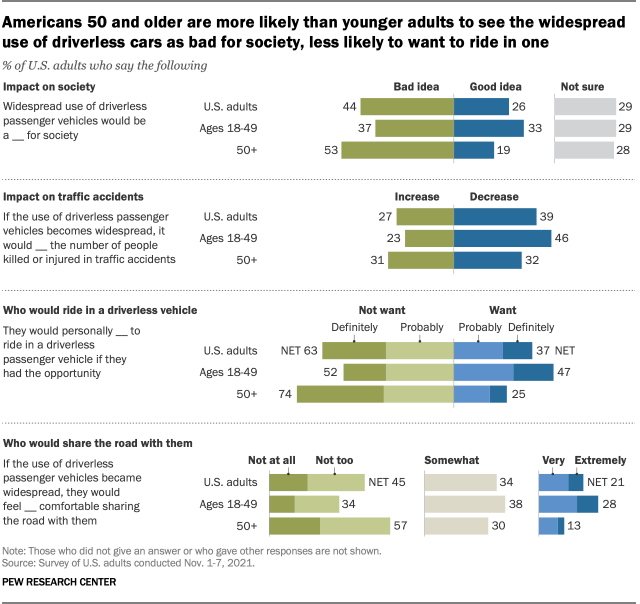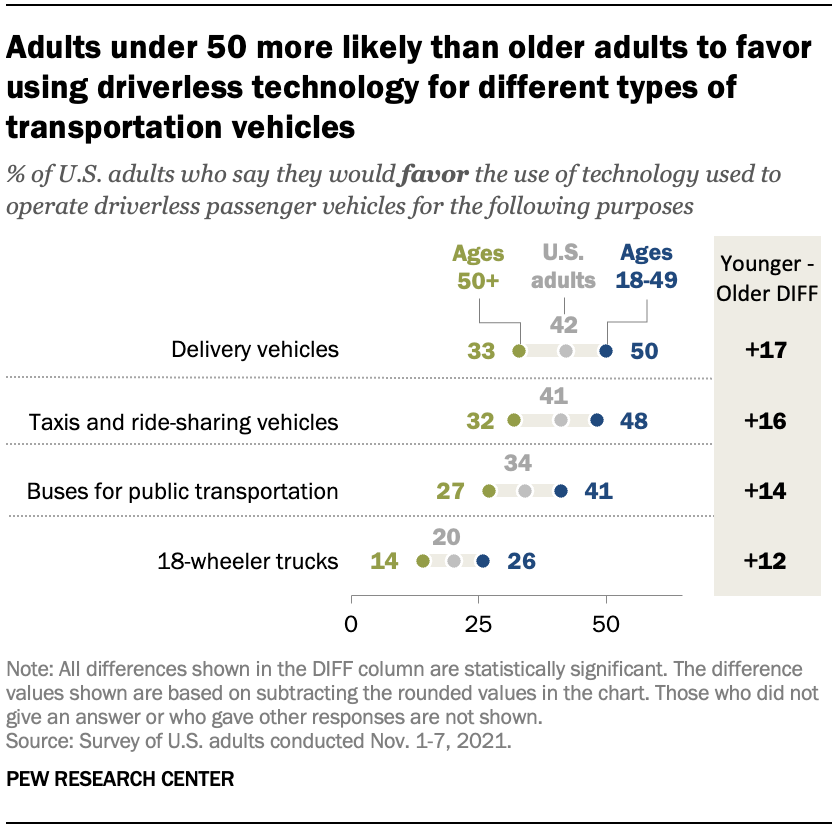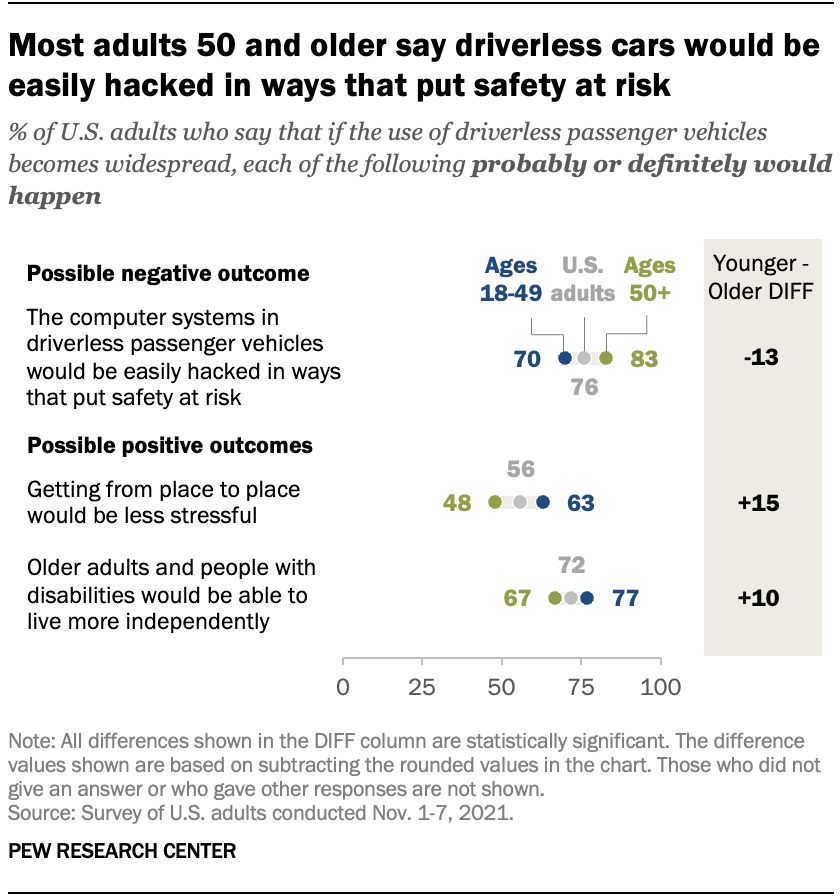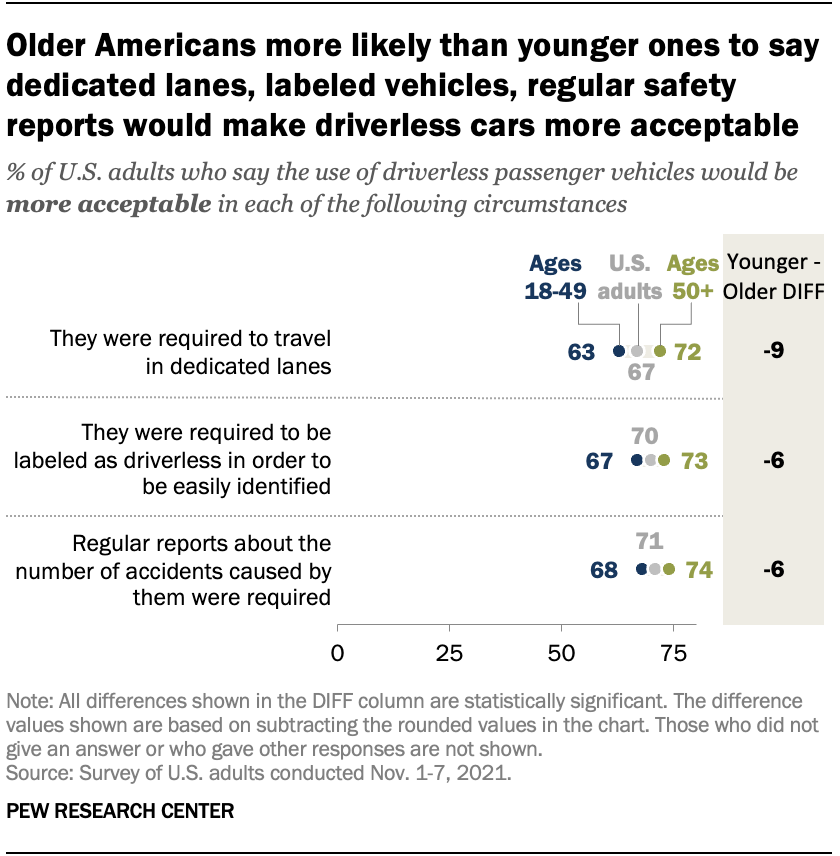
Americans are relatively cautious when it comes to the widespread use of driverless cars, and a new analysis of Pew Research Center survey data shows there is a clear age gap on the issue, with adults 50 and older more likely than younger adults to express wariness about the technology.

When asked about the broad impact driverless cars could have, 53% of those 50 and older say the widespread use of such vehicles would be a bad idea for society, compared with a smaller share (37%) of adults ages 18 to 49. Those 50 and older are also more likely than younger adults to say the widespread use of driverless cars would increase the number of people killed or injured in traffic accidents (31% vs. 23%).
Pew Research Center conducted this study to understand age differences in Americans’ views about driverless passenger vehicles. For this analysis, we surveyed 10,260 U.S. adults from Nov. 1-7, 2021.
Everyone who took part in the survey is a member of the Center’s American Trends Panel (ATP), an online survey panel that is recruited through national, random sampling of residential addresses. This way, nearly all U.S. adults have a chance of selection. The survey is weighted to be representative of the U.S. adult population by gender, race, ethnicity, partisan affiliation, education and other categories. Read more about the ATP’s methodology.
Here are the questions used for this analysis, along with responses, and its methodology.
The survey also measured people’s comfort toward the technology on a personal level. About three-quarters of those ages 50 and older (74%) say they would definitely or probably not want to ride in a driverless passenger vehicle, while 52% of adults under 50 say the same.
This age pattern persists when looking at people’s comfort levels in sharing the road with a driverless car. More than half of those 50 and older (57%) say they would be not at all or not too comfortable sharing the road with one, compared with 34% of those ages 18 to 49 who say this.
Younger adults are more likely to favor applying driverless vehicle technology to different types of vehicles

Given that the technology used to operate driverless cars can be applied to other kinds of transportation, the survey also explored the public’s views about some of the other types of vehicles that might employ such technology. Overall, around four-in-ten Americans say they favor the use of driverless technology in delivery vehicles (42%) and taxis and ride-sharing vehicles (41%). About a third (34%) say the same about its use in buses for public transit and 20% say they favor it for 18-wheeler trucks.
In each case, younger adults are more likely than older adults to say they favor the systems that are used in driverless cars being applied to other types of vehicles. Those ages 18 to 49 are 17 percentage points more likely than their elders to say they favor the technology use in delivery vehicles (50% vs. 33%) and 16 points more likely to say the same about use in taxis and ride-sharing vehicles (48% vs. 32%). There is a slightly smaller age gap among those who favor the technology’s use in 18-wheeler trucks: About a quarter of 18- to 49-year-olds (26%) say they would favor this, compared with 14% of adults 50 and older.
Older adults are less likely to think widespread use of driverless cars would bring societal benefits

The survey also asked Americans to weigh in on the likelihood that certain outcomes would happen if the use of driverless cars became widespread. In regard to the negative consequences, substantial majorities of Americans say the widespread use of driverless cars would definitely or probably lead to a loss of jobs among people who make their living by driving others or delivering things with passenger vehicles (83%) and that the computer systems would be easily hacked in ways that put safety at risk (76%). On the positive side, 56% say the technology would make getting from place to place less stressful and roughly three-quarters of Americans (72%) say older adults and people with disabilities would be able to live more independently.
Age differences also exist on these issues. For example, when asked whether computer systems in driverless passenger vehicles would be easily hacked in ways that put safety at risk, adults 50 and older are 13 percentage points more likely than adults under 50 to say this would happen (83% vs. 70%).
Younger adults, in turn, are more likely to see positive outcomes from the broad use of driverless passenger vehicles. Those ages 18 to 49 are 15 points more likely than their older counterparts to say the widespread use of these cars will make getting from place to place easier (63% vs. 48%). Younger adults are also 10 percentage points more likely to say older adults and people living with disabilities would be able to live more independently with the widespread use of driverless cars (77% vs. 67%).
There is no statistically significant difference by age when it comes to the public’s views on potential job losses caused by driverless cars among those who make their living driving others or delivering things with passenger vehicles.
Older adults are more likely to favor additional safety precautions for driverless cars

Overall, the majority of Americans say certain safety steps would make driverless cars more acceptable. About seven-in-ten U.S. adults say driverless passenger vehicles would be more acceptable if regular reports about the number of accidents caused by them were required (71%), if they were required to be labeled as driverless to be easily identified (70%), and if they were required to travel in dedicated lanes (67%).
Still, those ages 50 and older are more likely than younger adults to say each of these extra precautions would make driverless cars more acceptable.
Note: Here are the questions used for this analysis, along with responses, and its methodology.